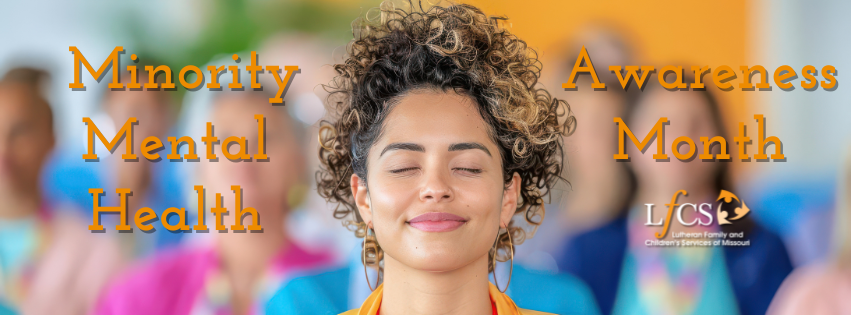
As July begins, we turn our attention to National Minority Mental Health Month – a crucial time dedicated to understanding and addressing the unique mental health challenges faced by racial and ethnic minority communities across the United States. This month is more than just a date on the calendar; it’s a vital opportunity to spark conversation, dismantle barriers, and champion equitable mental health support for everyone.
At Lutheran Family and Children’s Services of Missouri, we believe that mental well-being is a fundamental component of a healthy life, and access to quality care should never be determined by one’s background or socioeconomic status.

Unpacking Mental Health Disparities
The data paints a clear and challenging picture. While mental health concerns affect all communities, racial and ethnic minority groups often face significant hurdles in getting the care they need. For instance:
- As recently as 2023, among adults with any mental illness, Black (39%), Hispanic (36%), and Asian (25%) adults were significantly less likely than White (52%) adults to receive mental health services. (Source: KFF, 2023 Survey of Racism, Discrimination, and Health).
-
- Even more recent data shows that Asian Americans are significantly less likely to receive mental health treatment than non-Hispanic Whites. (Source: Office of Minority Health).
Understanding the Barriers
We recognize that individuals from Black, Hispanic, Asian, and other racial and ethnic minority backgrounds often face unique hurdles in accessing care. It’s unacceptable that such gaps persist, and at LFCS, we are determined to close this gap and ensure everyone has access to quality care, regardless of their background.
The reasons behind these disparities are complex and multifaceted. They include:
- Systemic discrimination. Experiences of racism and discrimination can contribute to mental health conditions and create a deep mistrust of institutions, including healthcare.
- Cultural stigma. In many cultures, talking about mental health is taboo, leading to silence, shame, and a reluctance to seek professional help.
- Lack of culturally competent providers. Finding a therapist who understands one’s cultural context, speaks their language, and can relate to one’s lived experiences is crucial but often challenging.
- Access issues. Minority groups are often less likely to have health insurance, face higher out-of-pocket costs, and experience longer wait times for appointments.

LFCS’s Commitment: Bridging the Divide
We believe in meeting people where they are by making mental health support accessible and responsive to community needs:
- We’ve expanded our services directly into schools in the St. Louis and Kansas City areas, making mental health support more accessible to young people who might otherwise go without care.
- Understanding that summer often leaves a critical gap in support, LFCS is currently offering free summer counseling and psychiatric services for youth ages 3-19 in St. Louis County, St. Charles County, and Franklin County, ensuring vital care continues when school is out.
- We are also offering free mental health services to kids 3-19 in Jackson County this summer.
The need for accessible mental health support is clear. In 2024 alone, LFCS provided counseling services to 10,454 children and their family members across Missouri, delivering over 30,331 service hours. These services often make a profound difference, showing the journey towards hope and healing. We are inspired by stories like Emily’s, exemplified in her courageous essay about her mental health journey.
Alarming trends further underscore the urgent need for youth mental health support: in 2023, non-Hispanic Black or African American female students in grades 9–12 were nearly two times more likely than non-Hispanic Black or African American male students to attempt suicide (Source: CDC, 2023 High School Youth Risk Behavior Survey Data). For a deeper dive into this vital topic, please read our article, “Addressing Mental Health Challenges Among Black Youth and Teens.”
How You Can Help This July
Minority Mental Health Awareness Month is a call to action for all of us. Here’s how you can join LFCS in advocating for equitable mental health care:
- Access our Children’s Mental Health Checklist for a Happy, Healthy New Year for helpful strategies parents can use year-round.
- Support Our Mission: Your donation helps us continue providing essential services to diverse families in need. Visit lfcsmo.org/donate.
- Follow and share our posts on social media using #MinorityMentalHealthMonth and #MMHAM.
- Download this BIPOC Mental Health Took Kit
- Gain insights into mental health disparities and LFCS’s work addressing them on our blog.

For more information about LFCS’s mental health services, visit lfcs.org, call 866-326-LFCS, or email [email protected].
